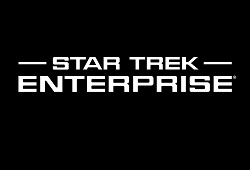
In the Star Trek film First Contact, Captain Jean-Luc Picard and his crew of Next Generation Starfleet officers pursue a Borg vessel backwards through time to the year 2063. It was the Borg’s intentions to wipe out the human race by erasing two of its most significant events – the initial warp drive flight of Zefram Cochrane and the subsequent “first contact” with an alien species. By the end of the film, the crew of the Enterprise is able to both defeat the Borg and ensure Cochrane’s historic achievement, which resulted in a Vulcan visit to Montana on April 5, 2063.
The second season episode “Carbon Creek” of the television series Star Trek: Enterprise, however, paints a different picture of the “first contact” between humans and Vulcans. Enterprise follows Captain Jonathan Archer and humanity’s first adventures in the “Final Frontier,” a full century after Cochrane but before the arrival of James T. Kirk.
Like the original Star Trek of the 1960s, Enterprise features a Vulcan serving as science officer, a female named T’Pol. In “Carbon Creek,” she recites the story of how her great-grandmother crash-landed on Earth in the 1950s and lived for a short time in an old mining town in Western Pennsylvania – making a brief visit to Pittsburgh during her stay as well.
According to T’Pol, her ancestor T’Mir was part of a research team sent to Earth following the launch of Sputnik – the first world’s artificial satellite – by the Soviet Union. During their investigation, the Vulcan ship malfunctioned and crashed near the town of Carbon Creek. The captain of the vessel died on impact, resulting in T’Mir taking charge of the remaining crew – herself and two Vulcan males named Mestral and Stron. Not knowing if their distress call was received by any Vulcan ships and eventually reaching the point of starvation, T’Mir and Mestral have no choice but to venture into Carbon Creek, albeit disguised as humans.
Stron soon joins them, and the three are able to make a living as a cleaning woman, miner, and plumber while still holding out hope that they will be rescued. Although T’Mir is concerned with the Vulcans “contaminating” the humans, it is the humans – especially Maggie, the owner of the Pine Tree Bar & Grill, and her teenage son Jack – who eventually contaminate the Vulcans. Mestral is the first to become emotionally involved and soon forms a different opinion of humans than his counterparts.
“If we remain here, we’ll die,” T’Mir tells the others. “This world is on the brink of self-annihilation. They revel in violence. They devote what little technology they have to devising ways to killing each other.”
“So did we, centuries ago,” Mestral counters. “They just haven’t realized their potential yet. They have great empathy. And compassion. Look at how we’ve been made to feel welcome.”
Despite a strict policy of non-intervention, Mestral is later compelled to assist in the rescue of twelve men trapped in a coal mine after a section of the shaft collapses. Although T’Mir is initially against using Vulcan technology to free the miners – who would no doubt die before their fellow humans could reach them – she does ultimately assist Mestral in saving their lives.
Eventually a Vulcan ship radios T’Mir and her crew, giving notice that they will arrive on Earth in three days to retrieve them. Complications arise, however, when young Jack tells T’Mir that he will not be able to attend college.
Jack is an intelligent teenager with a hunger for learning, traits that T’Mir finds admirable, but with a mother who owns a bar in a small coal town and a father who abandoned them years earlier, he is unable to raise the money needed to continue his education. T’Mir returns to her ship upon discovering this fact, rummages through the wreckage until she finds a small pouch, and then catches a train to Pittsburgh.
There she meets with the head of the Big Creek Manufacturing and Sales Company. “So you’re the lady with the invention that’s going to change the world,” he says to her. T’Mir does not respond but simply pulls the small pouch from her purse and shows him the Velcro that holds the fold-over lip closed. The businessman becomes fascinated with the Velcro and pays T’Mir the necessary funds for Jack attend college in exchange for the item.
When the time finally arrives for T’Mir, Mestral, and Stron to leave Earth, Mestral tells the others that he intends to stay behind. “They’re on the verge of countless social and technological advancements,” he explains. “I have the unique opportunity to study an emerging species.” Stron argues that it is against policy and urges T’Mir to order Mestral to return to Vulcan. Instead T’Mir allows Mestral’s to stay and tells the Vulcans sent to retrieve them that he died during their crash-landing in Western Pennsylvania.
Back on the Enterprise of the twenty-second century, Captain Jonathan Archer and Commander Trip Tucker find it difficult to believe that Vulcans landed on the planet over 100 years before history says they did, and that one of them remained on Earth to live the rest of his life undetected by humans. T’Pol remarks that she was just “telling a story,” easing their confusion, but when she later returns to her quarters, she pulls out the purse that had once belonged to her great-grandmother T’Mir.
The accuracy of her tale may never fully be revealed but according to “Carbon Creek” and Enterprise, Pittsburgh was visited by a Vulcan long before they made first contact with Zefram Cochrane in Montana – and became the city that invented Velcro as a result.
Anthony Letizia

